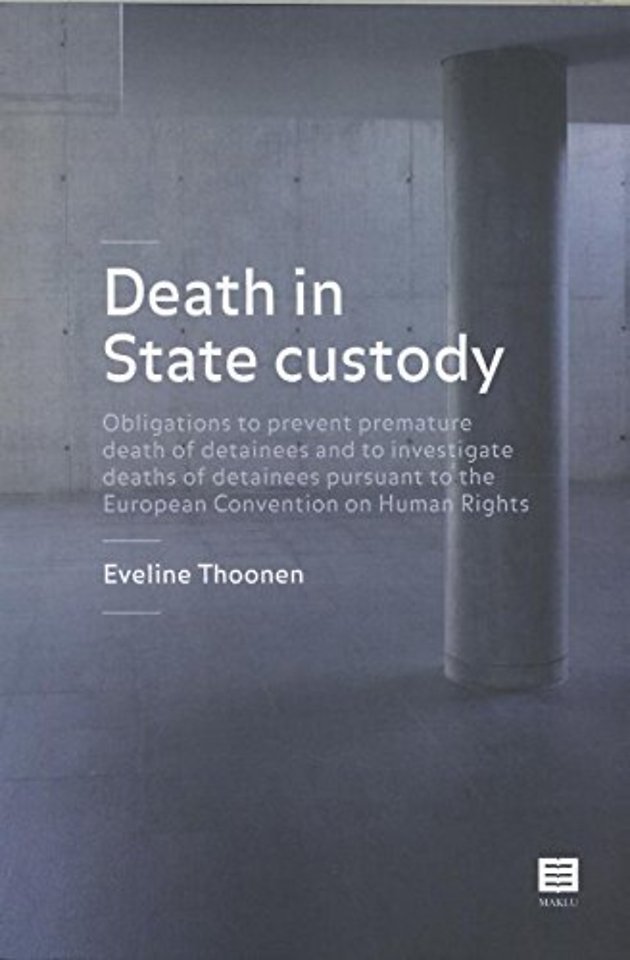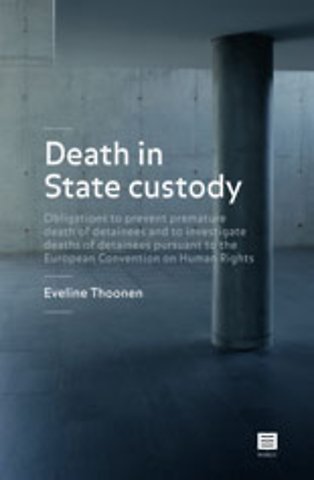Death in State Custody
Obligations to prevent premature death of detainees and to investigate deaths of detainees pursuant to the European Convention on Human Rights
Samenvatting
What is expected of State authorities with regard to the obligation to safeguard the life of detainees? What obligations do State authorities have in relation to the investigation into deaths that occur during deprivation of liberty by the State?
This book addresses these questions regarding death in State custody in view of the European Convention on Human Rights, in particular the right to life, the prohibition of torture and the right to respect for private life (including the right to self-determination). It also provides an analysis of whether the Dutch legal framework contains safeguards to meet the requirements that follow from the European Convention on Human Rights.
Matters that are discussed in detail are the obligation to provide healthcare to detainees and to take protective measures to safeguard the life of detainees. The ethical issues regarding end of life decisions of detainees, like refusal of medical treatment, hunger and/or thirst strike, suicide and euthanasia, and the conflicts that may arise in this regard considering the obligations of State authorities are addressed.
This book is a must-have for all those who are involved in the (medical) treatment of detainees and who are confronted with death in State custody.
Specificaties
Inhoudsopgave
LIST OF TRANSLATIONS 13
CHAPTER 1.
Introduction 23
1.1. Background and reasons for research 23
1.2. Research questions, demarcation and normative framework 28
1.3. Methodology, research sources and structure 36
1.4. To conclude 40
CHAPTER 2.
Deprivation of liberty within the meaning of the Convention 43
2.1. Introduction 43
2.2. The right to liberty 44
2.3. Deprivation of liberty by the State 47
2.3.1. Type or nature of the measure 49
2.3.2. Duration of the measure 56
2.3.3. Effects on the person concerned and manner of execution 58
2.3.4. Outset, consequences and end of deprivation of liberty by the State 59
2.4. Deprivation of liberty in a criminal justice context 65
2.4.1. Reasonable suspicion of an offence 66
2.4.2. Conviction by a competent court 68
2.4.3. Court order and obligation prescribed by law 69
2.4.4. Extradition 70
2.5. Concluding remarks 70
CHAPTER 3.
Deprivation of liberty in the Dutch criminal justice context 73
3.1. Introduction 73
3.2. Preliminary remarks on the criminal justice system in the Netherlands 74
3.3. Deprivation of liberty in the Dutch criminal justice system 76
3.3.1. Reasonable suspicion of an offence 77
3.3.2. Conviction by a competent court 80
3.3.3. Court order and obligation prescribed by law 87
3.3.4. Extradition 91
3.4. Consequences of deprivation of liberty by the State 92
3.5. Concluding remarks 93
CHAPTER 4.
Obligations arising from the Convention to avert premature death of detainees 97
4.1. Introduction 97
4.2. Protective measures to prevent death because of the State 104
4.3. Protective measures to prevent lethal violence by other detainees 106
4.4. Healthcare and protective measures to avert premature death due to health issues 107
4.4.1. Preliminary remarks 107
4.4.2. Appropriate environment 113
4.4.3. Access to healthcare 120
4.4.4. Quality of healthcare 127
4.4.5. Continuity of healthcare 133
4.4.6. (Medical) record and transfer of information 134
4.4.7. Medication safety 137
4.4.8. Evaluation of healthcare 138
4.5. Obligations of Member States versus end of life decisions of detainees 139
4.5.1. Refusal of treatment 140
4.5.2. Hunger and/or thirst strike 145
4.5.3. Stop eating and drinking to hasten the end of life 148
4.5.4. Suicide 149
4.5.5. Euthanasia and assisted suicide 162
4.6. Concluding remarks 164
CHAPTER 5.
Implementation of obligations to avert premature death of detainees in the Netherlands 171
5.1. Introduction 171
5.2. Protective measures to prevent death because of the State 172
5.3. Protective measures to prevent lethal violence by other detainees 174
5.4. Healthcare and protective measures to avert premature death due to health issues 177
5.4.1. Appropriate environment 181
5.4.2. Access to healthcare 190
5.4.3. Quality of healthcare 214
5.4.4. Continuity of healthcare 225
5.4.5. (Medical) record and transfer of information 229
5.4.6. Medication safety 243
5.4.7. Evaluation of healthcare 250
5.5. Obligations of Member States versus end of life decisions of detainees 253
5.5.1. Refusal of treatment 253
5.5.2. Hunger and/or thirst strike 259
5.5.3. Stop eating and drinking to hasten the end of life 261
5.5.4. Suicide 262
5.5.5. Euthanasia and assisted suicide 272
5.6. Concluding remarks 280
CHAPTER 6.
Procedural obligations to investigate deaths pursuant to Article 2 ECHR 285
6.1. Introduction 285
6.2. Obligation to set up an effective system 286
6.3. Obligation to perform an effective investigation into death of a detainee 289
6.3.1. General principles 289
6.3.2. Minimum standards for the effectiveness of the investigation 296
6.4. Concluding remarks 315
CHAPTER 7.
Implementation of procedural obligations to investigate deaths in the Netherlands 317
7.1. Introduction 317
7.2. Applicable legal regimes 318
7.3. Initiative of the State 332
7.4. Independence and impartiality 337
7.5. Prompt response and reasonable expedition 350
7.6. Involvement of next of kin 356
7.7. Public scrutiny 367
7.8. Concluding remarks 371
CHAPTER 8.
Synthesis 373
8.1. Questions arising after the death of a detainee 373
8.2. Accountability and extra protection of detainees 374
8.3. Extra protection of detainees and the right to self-determination of detainees with regard to end of life decisions 381
8.4. Proposed amendments for the Netherlands and final remarks 392
SUMMARY 395
SAMENVATTING 401
BIBLIOGRAPHY 409
CASE LAW 443
CURRICULUM VITAE 463
Anderen die dit boek kochten, kochten ook
Net verschenen
Rubrieken
- aanbestedingsrecht
- aansprakelijkheids- en verzekeringsrecht
- accountancy
- algemeen juridisch
- arbeidsrecht
- bank- en effectenrecht
- bestuursrecht
- bouwrecht
- burgerlijk recht en procesrecht
- europees-internationaal recht
- fiscaal recht
- gezondheidsrecht
- insolventierecht
- intellectuele eigendom en ict-recht
- management
- mens en maatschappij
- milieu- en omgevingsrecht
- notarieel recht
- ondernemingsrecht
- pensioenrecht
- personen- en familierecht
- sociale zekerheidsrecht
- staatsrecht
- strafrecht en criminologie
- vastgoed- en huurrecht
- vreemdelingenrecht








